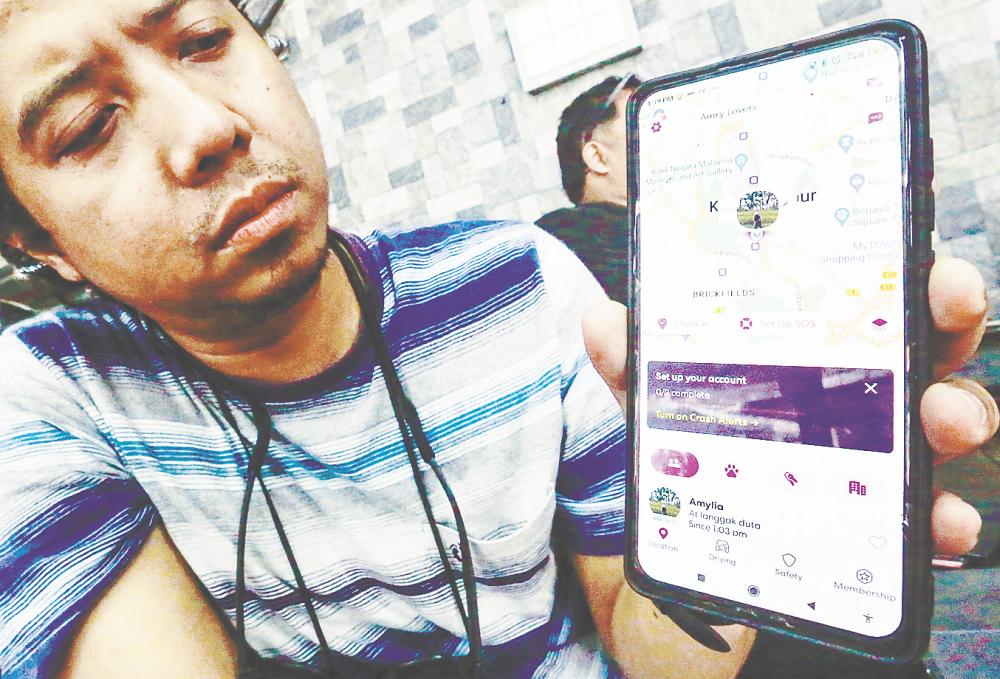PETALING JAYA: With Home Minister Datuk Seri Saifuddin Nasution Ismail reporting in October 2024 that 3,847 children under 18 years old have gone missing between 2020 and September 2024, many families are installing location tracking apps on their children’s phones to ascertain their whereabouts at any given time.
On Feb 12, a female food trader in Kuantan, Pahang went missing after delivering an order. Her body was found the following day by a riverbank, highlighting the dangers that individuals face.
Universiti Teknologi Mara College of Computing, Informatics and Mathematics senior lecturer and cybersecurity expert Assoc Prof Dr Muhamad Khairulnizam Zaini said apps such as Life360, FindMyKids and other tracking tools have evolved from mere conveniences to essential safeguards in today’s crime-filled world.
“These apps allow family members to track each other’s whereabouts in real time, reducing worries and providing peace of mind. Parents can monitor their children’s locations, especially when they are in public spaces, and this offers a sense of security.”
He said many of these apps include safety features such as SOS alerts and alarms, which notify trusted contacts in cases of emergency, but cautioned that such apps could come with risks.
“Data breaches could expose real-time locations, personal details and contact information, making users vulnerable to stalking or theft. Hackers could misuse this data to track movements or identify home addresses, especially of children.”
He advised users to enable two-factor authentication, keep their app updated and limit location sharing to trusted contacts.
“It is best to disable tracking features when not in use and especially while at home, to reduce exposure.”
He stressed the importance of constant monitoring and education, especially for children, adding that tech-savvy family members should guide others on how to use the apps responsibly to prevent mishaps, especially since the tools could protect loved ones when used responsibly.
“It is essential to balance convenience with privacy and security to ensure these apps serve their purpose without compromising personal safety.”
Universiti Putra Malaysia Faculty of Human Ecology senior lecturer Dr
Mohamad Naqiuddin Dahamat Azam said while such apps offer safety, families must use them responsibly and with consent.
“These apps help ease anxiety. Knowing that a child has arrived safely at school, a friend’s house or home could significantly reduce parental stress. They also encourage responsible independence, allowing young users to explore the world with a safety net while maintaining their autonomy.”
He said it is important to balance safety with privacy and trust, ensuring location sharing is consensual and used as a supportive tool rather than a means of constant surveillance.
Mother of four Ruslina Abd Majid, 53, uses a location tracking app to ensure her children’s safety and said even her eldest daughter, who is 28 years old, regularly updates her on her whereabouts.
“The app tracks her location at all times, whether she is in a car or on a train. It even shows me if she is moving. The tracker on the map will move along the route she is taking, giving me real-time updates on her location and movement.
“My eldest daughter can take care of herself but in today’s world, it is better to be prepared. Even adults can go missing.
“We are living in terrifying times, with many cases of murder and missing people. I worry a lot, even when they say they are going out with friends, because anything could happen.
“If I notice the tracker suddenly stops or shows them in a suspicious location, I immediately call to check if they are okay,” she said, adding that the tracker provides peace of mind, knowing her children are safe wherever they are.









